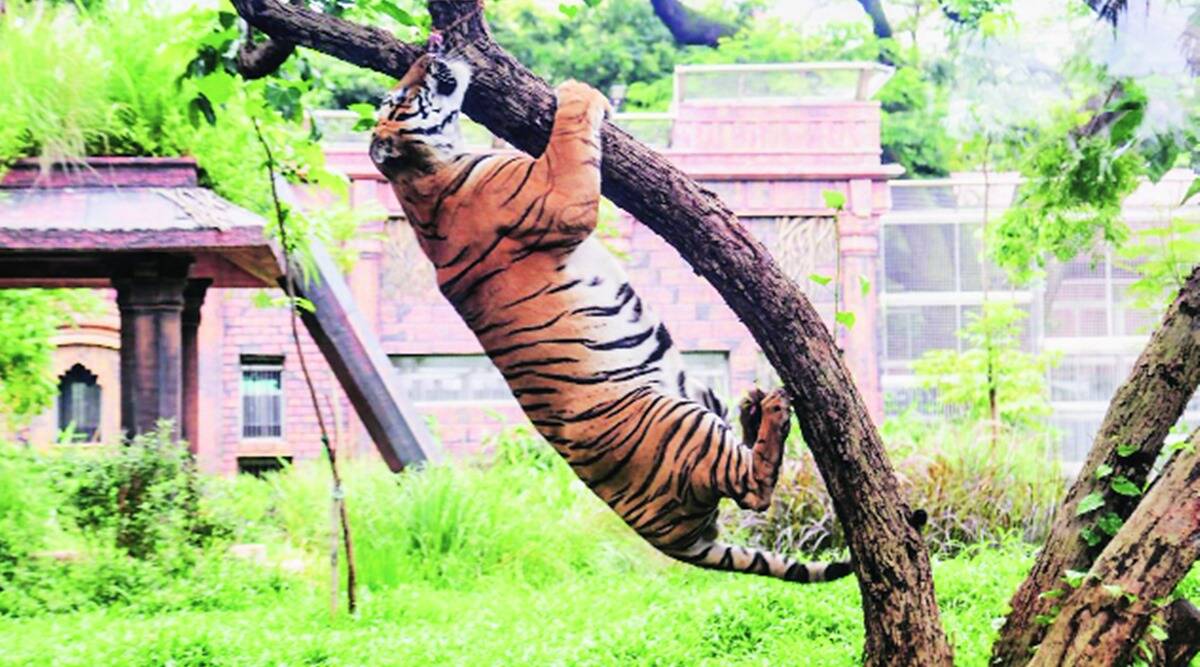 After 11 months, the Byculla zoo had re-opened for visitors in February this year. It was again shut in April after Covid-19 cases started rising. (Representational Image/BMC)
After 11 months, the Byculla zoo had re-opened for visitors in February this year. It was again shut in April after Covid-19 cases started rising. (Representational Image/BMC) COVID-19 TESTING of staffers at regular intervals, restricted access to animal enclosures and regular health check-up of animals are some of the measures that Mumbai’s Veer Mata Jijabai Bhosale Udyan and Zoo has been taking since the pandemic began last year.
An official from the Byculla zoo said, “Currently, no testing of the animals is required. As per the guidelines issued last year, regular health check-ups of the zoo workers and that of animals are being conducted. We are monitoring symptoms like coughing, nasal discharge, respiratory distress, diarrhoea, anorexia, nervous symptoms and fever among the animals.”
After 11 months, the Byculla zoo had re-opened for visitors in February this year. It was again shut in April after Covid-19 cases started rising.
In Mumbai, Sanjay Gandhi National Park has 20 captive animals, while the Byculla zoo has nearly 335 animals, birds and reptiles. Of the total animals, 12 are mammals, including a pair of tigers, leopards, hyenas, hippopotamus and a lone elephant.
“We are following the CZA guidelines, i.e., regular sanitisation of the enclosures and observation of the animals for any symptoms. Every 15 days, we are conducting RT-PCR tests for the staff, who are handling the animals. Except for the concerned staff, no one else is allowed to go inside the enclosures. There has been no need to collect swabs of animals from SGNP for Covid-19 test. If we have to take a swab test, we have to sedate the animal which is also a risk,” said G Mallikarjuna, SGNP director.
A nasal or an oral swab of the animals for the Covid-19 test is only collected if symptoms are diagnosed. The samples from the wild animals will be collected either by the ‘squeeze cage’ method or by tranquilising them.
In the ‘squeeze cage’ method, the animal will be confined in a cage without any space so that it cannot move or resist while taking samples. India has four designated Covid-19 testing centres for captive animals.
After eight Asiatic lions at Hyderabad zoo tested positive for Covid-19, rescue centres and national parks that have captive animals and zoos across the country are vigilant.
In April last year, after a tiger at a US zoo tested positive for coronavirus, the Central Zoo Authority (CZA) had asked all zoos across the country to be on high alert and collect samples fortnightly in suspected cases.
Because of the rapid spread of the coronavirus in the country, the Ministry of Environment, Forest and Climate Change recently issued an advisory to close all zoological parks, national parks, tiger reserves and wildlife sanctuaries for visitors till further orders to control the spread of the pandemic.
- The Indian Express website has been rated GREEN for its credibility and trustworthiness by Newsguard, a global service that rates news sources for their journalistic standards.

